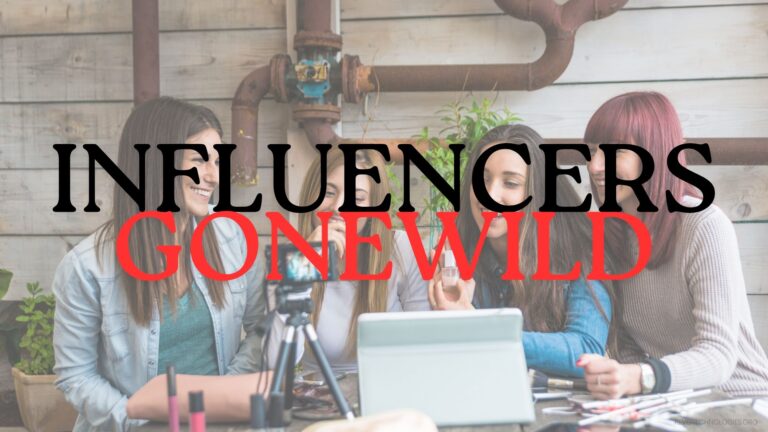Influencer marketing has become one of the most powerful tools in a digital marketer’s arsenal, but it’s not without risks. From skyrocketing brand awareness to PR nightmares, partnering with influencers can lead to extraordinary success—or chaos. What happens when “Influencers Gone Wild” ends up being your marketing campaign’s story? For digital marketers and social media managers, understanding how to avoid pitfalls and leverage influencers effectively is essential.
This guide dives into the challenges, rewards, and strategies behind influencer marketing, helping you take the wild out of “Influencers Gone Wild” and make informed strategic decisions along the way.
Table of Contents
What Happens When Influencers Go Wild?
Influencer marketing today is a $16.4 billion industry that grows by the day. Influencers have the power to make or break a brand’s reputation overnight. Why? Because they are trusted by their audiences, holding sway over purchasing decisions more directly than traditional advertisements. But as brands chase after the ROI of engaging influencers, sometimes things take a wild—and unfortunate—turn.
When campaigns go haywire, the internet reacts fast. “Going wild” could mean anything from reckless influencer behavior, unprofessional content mishaps, or even outright scandals. These instances can damage a brand’s reputation or make it the punchline of a viral joke. And, as a marketer, it’s your job to preempt and avoid getting pulled into that chaos.
The Dark Side of Influencer Marketing
While influencer marketing can yield phenomenal results, it isn’t without its share of pitfalls and risks. If not managed properly, collaborations can backfire in ways that feel very public…and very permanent.
Here are some cautionary tales to consider:
- The Controversial Partnership
Remember when a major food brand partnered with an influencer who later came under fire for controversial tweets? The backlash hurt not just the influencer’s reputation but also diminished consumer trust in the brand.
- Overhyped but Underwhelmed Campaigns
Then there are influencers who promise brands the moon and the stars, only for campaigns to underperform because their real engagement metrics didn’t match their inflated follower counts.
- Unethical Influencers
Brands have also fallen for influencers who’ve bought followers or engagement—resulting in campaigns that don’t deliver real ROI.
These examples underline the necessity of thorough vetting and caution. A poor fit can lead to wasted budgets, PR disasters, and customer discontent.
Spotting Red Flags and Managing Risks
The warning signs are often there if you know what to look for. Here are some key red flags to watch for before signing on with an influencer:
- A Mismatch in Values: Does this influencer’s content align with your brand’s messaging and tone?
- Low Engagement Rates: Even with a large follower count, an influencer might not have meaningful engagement.
- Past Controversies: Research their previous campaigns and social media posts. Any history of questionable behavior is a major warning sign.
- Unprofessional Behavior: Missed deadlines or vague communication during early interactions risks escalating during a campaign.
Mitigation Strategies
To prevent issues:
- Use contracts that clearly outline expectations, deliverables, and criteria for success.
- Rely on influencer platforms (like AspireIQ or Upfluence) to cross-check metrics, followers, and audience demographics.
- Run a trial campaign or smaller collaboration to test-fit before committing to a larger partnership.
The Power of Authenticity and Compliance
At the core of any successful influencer partnership is authenticity. Modern audiences are quick to spot and call out inauthentic promotions, which can hurt both the influencer and your brand. To ensure this doesn’t happen:
- Work with Influencers Who Genuinely Love Your Brand: An authentic endorsement resonates more effectively with their audience.
- Encourage Transparency: Sponsored posts should always be clearly disclosed to maintain trust.
- Stay Legally Compliant: Ensure both you and your influencer adhere to FTC guidelines. Failure to disclose paid collaborations can lead to fines or customer backlash.
Case Studies to Learn From
What Went Wrong
The Fyre Festival Disaster
What was marketed as a luxury music festival quickly turned into infamy due to overpromising influencer campaigns coupled with the festival’s catastrophic organization. The influencers failed to vet the offering they were promoting, which tarnished both their reputations and the festival organizers’.
What Went Right
Daniel Wellington Watches
This watch brand revolutionized influencer marketing by collaborating with micro-influencers, focusing on authentic storytelling and ambassador-style programs. By prioritizing authenticity and brand fit, they grew from a small startup to a globally recognized brand.
Lessons Learned:
- Keep influencers informed and aligned with your goals.
- Smaller, niche influencers can offer higher engagement and build trust over time.
Tools to Make Influencer Vetting a Breeze
Working with the right tools ensures your influencer campaigns are informed, scalable, and efficient. Here are some game-changing platforms worth exploring:
- AspireIQ: Seamlessly connect with influencers and measure campaign ROI.
- Upfluence: Identify influencers through powerful AI-based tools and analytics.
- HypeAuditor: Analyze detailed metrics like engagement, follower authenticity, and audience demographics to ensure influencer legitimacy.
These resources streamline influencer discovery, vetting, and campaign management—allowing you to focus on crafting impactful strategies.
Leading with Strategy, Not Sheer Popularity
Influencer marketing can be a wild ride, but it doesn’t have to spiral out of control. By strategically vetting influencers, advocating authenticity, and leveraging the right tools, your campaigns can reach new heights while protecting your brand’s reputation.
What’s been your experience working with influencers? Have you learned any hard lessons or struck gold with the perfect partnership? Share with us in the comments below—we’re always eager to hear from our community!
Need help managing your influencer strategy? Reach out to us for a consultation or a demo of our influencer marketing platform.


